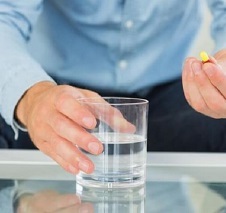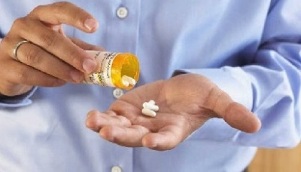
Antibiotics for chronic prostatitis are prescribed to eliminate the bacterial factor that causes inflammation of the pancreas.
The goal of antibiotic therapy is to relieve symptoms, prevent complications, and restore normal prostate function.
Funds are determined by the attending physician based on test results. The generic name "antibiotics" means several groups of drugs with different compositions with clear antibacterial activity.
True antibiotics are substances of natural (natural) origin or their completely synthetic analogues.
Classification of chronic prostatitis
There are three main forms of chronic prostatitis:
- Chronic bacterial prostatitisis a lesion of the prostate gland associated with the development of pathogenic microflora. It continues with similar symptoms with symptoms of acute prostatitis (pain during urination, the presence of pus and blood in the urine, etc. ), but has more blurred (simplified) manifestations.
- Chronic non-bacterial prostatitisis a type of damage to the male prostate gland in which infectious diseases are detected that are caused by pathogenic bacteria (such as trauma or the formation of stones in the prostate). However, the name of the pathology refers not only to the course of the disease, but also to its etiology, because in the process of pathogenesis is noted the development of the same pathogenic microflora as other types of prostatitis.
- Chronic asymptomatic prostatitisis a pathology of the prostate gland associated with the presence of pathogenic microflora in the prostate gland and is asymptomatic or almost asymptomatic. It is important! When these types of diseases are usually detected at the time of diagnosis based on the presence of pathological events such as leukosituria and / or bacteriuria, an additional diagnosis is needed. This is due to the similarity of chronic asymptomatic prostatitis with prostate cancer.
Thus, the use of antibiotics is recommended in all cases, regardless of the type of chronic prostatitis. The drugs used to define therapeutic practice as the drug of choice will be discussed below. For a list of chronic prostatitis, you should start by offering readers antibiotics.
What antibiotics are there?
In recent years, the resistance of bacteria to certain drugs has increased dramatically, so before starting antibiotic treatment for prostatitis in men, the patient should be determined the resistance of certain microorganisms to certain drugs for the entire STI group and pathogenic flora.
What antibiotics are used to treat prostatitis at home? There are the following groups of antibacterial drugs (the best antibiotics for prostatitis in men):
- Penicillins.In the past, such antibiotics were actively used for prostatitis, but with the advent of the most active antibacterial drugs, they lost their clinical significance due to the increase in the number of penicillin-resistant negative bacteria.
- Macrolides.These antibiotics for prostatitis have a wide range of effects and low toxicity.
- Tetracyclines.Activity against gonococci, chlamydia, mycoplasma. It is widely used in the treatment of chronic infectious prostatitis caused by the above pathogens.
- Fluoroquinolones.It is often used for the complex treatment of chronic inflammation of the prostate and in acute uncomplicated inflammation of the prostate gland (efficiency up to 100%). They have high activity and low toxicity (do not disturb the intestinal microflora).
- Cephalosporins.It is actively used in the treatment of acute forms of bacterial prostatitis. They are good antibiotics for prostatitis, have a wide range of effects and high activity against pathogenic bacteria.

Also, modern medicine uses antibiotics for prostatitis or other diseases:
- quickly destroys the source of the disease and eliminates inflammation;
- produces substances that kill or stop the growth of bacteria and large viruses, but are safe for macroorganism cells; When administered externally (suppository, ointment) and other methods of application: intramuscular, oral, intravenous;
- fight many pathogens (broad-spectrum antibiotics) at the same time.
What are the most effective antibiotics
Strictly follow your doctor's advice to treat or reduce the symptoms of infectious prostatitis. Start the course only after the diagnosis, when the doctor understands the nature of the disease. Self-medication at home is fraught with devastating consequences and malfunctions of the body's systems.
Recommendations for antibiotic treatment
Side effects from antibiotics can be as bothersome as worsening prostatitis.
Typical disadvantages of each drug group:
- Penicillins: rash, dermatitis, diarrhea;
- Cephalosporins: diarrhea. Rash and fever are rare;
- Macrolides: nausea, vomiting. Sometimes colitis, cholestatic jaundice occurs;
- Fluoroquinolones: abdominal pain, diarrhea.
Diarrhea is the most common side effect of antibiotics. There are two reasons: the imbalance of the intestinal microflora, the overgrowth of bacteria called Clostridium difficile. By taking pro- and prebiotics in parallel, it is possible to prevent and eliminate diarrhea.
Non-antibacterial therapy
In addition to antibiotics, the following treatments are used to successfully treat prostatitis, especially chronic prostatitis:
- Prostate massage is the best way to improve blood circulation and discharge inflammatory secretions from the prostate gland;
- physiotherapy;
- non-steroidal anti-inflammatory drugs - not used in parallel with fluoroquinolones;
- herbal preparations;
- alpha blockers.
In order to effectively treat a disease, it is necessary to diagnose the type of bacteria that causes the disease in a particular patient, showing sensitivity to the drug. Based on the results of the tests, the doctor will tell you what to do to treat chronic prostatitis or an acute form of the disease.
























